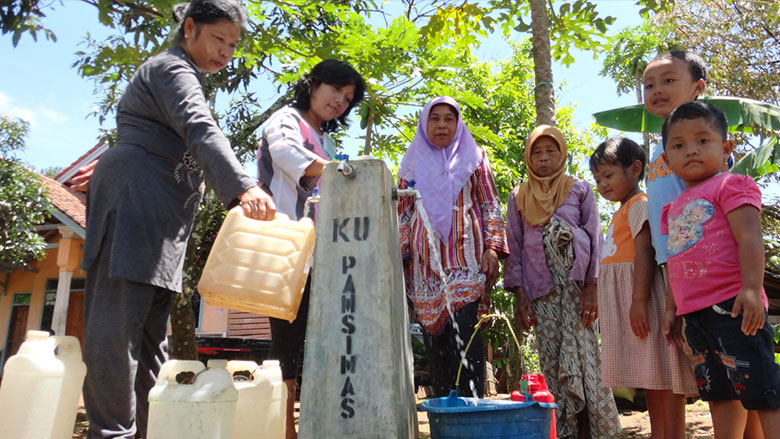Challenge
Improving access to safe water and sanitation is a key priority, due to the consequences of poor sanitation infrastructure on public health and the environment. Of the four main causes of under-5 mortality in Indonesia, two—diarrhea and typhoid—are fecal-borne illnesses linked to inadequate water supply, sanitation issues, including open defecation and lack of proper toilets, also poor hygiene practices. Difficult access to improved water supply also means that poor households spend too much time fetching water. Delivery of services in the rural areas has its specific challenges, including the large number of villages across the archipelago, governed under 514 local governments with different cultures, levels of capacity and resources.
Approach
PAMSIMAS aims to increase the use of water and sanitation facilities, and improve hygiene behaviors, by expanding and mainstreaming the community-driven approach. The project provides grants directly to communities for local water and sanitation infrastructure and technical assistance to enhance the role of the community through capacity building, planning, procurement and management, including community monitoring with a web-based and mobile monitoring system. Consultancy services and training are also provided for facilitators and communities to improve their sanitation and hygiene behavior and practices.
Results
Between 2006 and the end of 2018:
- PAMSIMAS reached 22,961 villages spread across 376 districts in 33 provinces. The project benefited about 17.2 million people with access to improved water facilities (above the 2018 target of 16 million people), and 15.4 million people with access to basic and improved sanitation.
- Open defecation free status among targeted communities markedly improved from 0% to 58%, and about 81% of targeted schools improved their sanitation facilities and hygiene programs.
- 68% of target communities adopted handwashing programs. Planning is well above target, with over 28,731 villages having completed community action plans.
- Institutional sustainability of the PAMSIMAS approach was positive, with 97% of districts replicating the project’s approach outside targeted communities, and 86% of districts with increased expenditure towards meeting universal access to water and sanitation.
- PAMSIMAS developed systems that provide approximately over 42,000 liter/second of water in almost 17,000 villages, with 2 million house connections.
- Over 1,650 villages adopted disability inclusive design for public facilities in Pamsimas.
- 357 districts formed water user associations that would support local governments to achieve universal access and sustainability program.
Bank Group Contribution
Between 2006 to 2018, the Bank contributed $137.5 million through an International Development Association (IDA) credit, and $399.9 million through a International Bank for Reconstruction and Development (IBRD) Loan.
Partners
The success of PAMSIMAS relies on strong collaboration between the key partners in the water and sanitation sector in Indonesia. The central government of Indonesia contributed $537.4 million and the local governments across Indonesia supported through regional budgets, a sharing program (replication), support for the preparation of local action plans for water and sanitation sector all these help to ensure the project’s sustainability. In addition, the Australian government contributed $102 million.
Moving Forward
To achieve universal access to water and sanitation, the government decided to support all villages to develop community actions plans (CAPs), well beyond requirement of the project. The plans are intended to leverage various sources of financing including government special allocation funds, district incentive grants, special optimization grants, village funds, private sector, and district corporate social responsibility. Long term sustainability is ensured through Community-based Associations capable to manage and finance the facilities, also by strengthening local governments to ensure long term operation of water supply systems and permanent adoption of sanitation behaviors.
Beneficiaries
“Before 2014, I used brackish water from drill wells and shallow wells in my village. When it’s the rainy season, I used rainwater. Sometimes I buy water from a local water supplier truck. Brackish water is only for washing kitchen utensils. If I use it for bathing, my body feels sticky. After PAMSIMAS built pipelines and water meters in my village, I am very comfortable and find it easy to get clean water for any need,” said one resident of Pitusungu Village, Pangkajene Kepulauan District, South Sulawesi.
